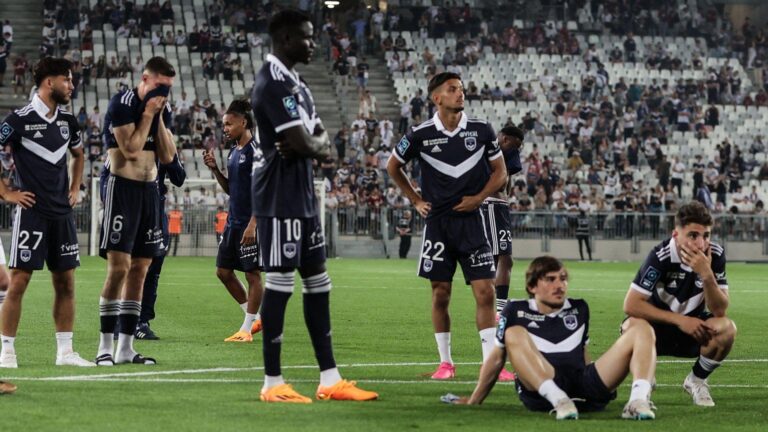The Demise of Bordeaux Casts Dark Cloud Over the Future of French Soccer
As the historic club FC Girondins de Bordeaux faces its uncertain demise, the future of French soccer is being called into question. Once a powerhouse in Ligue 1, Bordeaux’s decline exemplifies the financial turbulence plaguing many teams across the nation. The club’s struggles highlight deeper issues within the French soccer ecosystem, raising concerns about the sustainability and competitive landscape of the sport. With a legacy steeped in rich history and notable triumphs, the downfall of Bordeaux is not only a poignant reminder of the fragility of professional sports but also serves as a harbinger for other clubs navigating similar challenges. In this article, we delve into the implications of Bordeaux’s predicament and explore how it may shape the broader future of soccer in France.
Impact of Bordeaux’s Financial Troubles on French Soccer’s Stability
The financial struggles faced by Bordeaux have sent ripples through the entire landscape of French soccer, raising concerns about the sustainability of clubs outside the elite. As one of the country’s most storied teams, Bordeaux’s demise serves as a stark reminder of the fragility within the league, where tight budgets and reliance on revenue from ticket sales and sponsorships can lead to catastrophic outcomes. The potential fallout includes:
- Declining Investment: Investors may become wary of committing funds to clubs that lack financial stability.
- Increased Financial Pressure: Other teams could face heightened pressures to adapt their financial models to avoid similar fates.
- Youth Development Concerns: A reduced financial capacity may hinder clubs’ abilities to nurture young talent, affecting the national team’s future performance.
Moreover, Bordeaux’s situation may catalyze a reevaluation of existing financial regulations established by the Ligue de Football Professionnel (LFP). Discussions around stricter financial fair play policies are already on the table, with stakeholders emphasizing a more equitable distribution of resources. This could lead to:
- Lower Competition Balance: Wealthier clubs might resist changes that threaten their dominance.
- Greater Support for Struggling Teams: Initiatives aimed at providing financial aid may arise, but their effectiveness remains to be seen.
- Adaptation of Business Models: Clubs could experiment with new income-generating strategies, such as enhanced digital offerings or community engagement initiatives.
| Impact Area | Potential Changes |
|---|---|
| Investment Climate | More cautious investors |
| Competitive Balance | Shift in power dynamics |
| Youth Development | Investment in academies at risk |
Lessons from Bordeaux: Assessing the Governance Failures in French Football
The downfall of FC Girondins de Bordeaux highlights significant governance issues within French football that demand urgent attention. As clubs face mounting financial pressures and inconsistent performance, the need for effective leadership becomes paramount. The Bordeaux situation serves as a cautionary tale, revealing how a lack of transparency and accountability can jeopardize the future of not only a revered club but also the broader framework of French soccer.
Key challenges facing governance in French football include:
- Financial Mismanagement: Excessive debt and failure to adhere to financial fair play regulations have severely impacted club operations.
- Lack of Strategic Vision: Short-term thinking can lead to poorly planned transfers and long-term instability.
- Insufficient Stakeholder Engagement: Fans and local communities often feel sidelined in decision-making processes.
To further understand the implications of Bordeaux’s decline, consider the table below summarizing the main governance failures and their potential impacts:
| Governance Failure | Potential Impact |
|---|---|
| Inadequate Financial Oversight | Risk of insolvency and loss of club identity |
| Poor Leadership Decisions | Declining competitive performance |
| Weak Community Ties | Decreased fan support and reduced revenue |
Future Prospects: Building a Sustainable Model for French Soccer
The recent struggles of FC Girondins de Bordeaux highlight the pressing need for a re-evaluation of financial strategies within French soccer. As traditionally successful clubs face mounting debt and instability, a sustainable model becomes imperative. Stakeholders must consider a shift towards more equitable financial practices that prioritize long-term viability over short-term gains. This can be achieved through:
- Transparent Revenue Sharing: Implementing fair distribution of broadcasting rights and sponsorship deals.
- Investment in Youth Academies: Fostering local talent can reduce reliance on expensive transfers.
- Sustainable Partnership Models: Collaborations with local businesses to stabilize club finances.
Additionally, the modern landscape demands a pivot towards digital engagement and global outreach. Clubs need to harness technology to expand their fanbase and diversify income streams. Focusing on the international market can offer lucrative opportunities through merchandise sales and digital content. A table illustrating the potential revenue sources for clubs illustrates this point:
| Revenue Source | Potential Growth |
|---|---|
| Merchandise Sales | High |
| Broadcast Rights | Moderate |
| Digital Media | Very High |
| Sponsorship Deals | Moderate |
Calls for Reform: Strategies to Prevent Further Decline in Club Viability
The troubling fate of Bordeaux has sparked urgent demands for strategic reforms to safeguard the viability of clubs across France. Key stakeholders, including team managers, financial experts, and fan representatives, are advocating for a comprehensive overhaul of current operational frameworks. To foster sustainability, the following strategies have been proposed:
- Financial Transparency: Implementing strict auditing processes to enhance accountability and ensure clubs manage their finances prudently.
- Youth Development Investment: Fostering local talent through enhanced youth academies, reducing reliance on expensive signings and nurturing homegrown players.
- Revenue Diversification: Encouraging clubs to explore new income streams, such as merchandise sales and community events.
- Regulatory Frameworks: Establishing a more robust set of regulations that ensure equitable financial practices across the league.
Furthermore, clubs must prioritize collaboration with local governments and businesses to bolster community support. A potential strategy includes forming partnerships that can lead to shared venues and resources, lowering operational costs significantly. The table below outlines suggested collaborative efforts for clubs seeking to enhance local engagement:
| Strategy | Expected Benefit |
|---|---|
| Joint Community Events | Increased fan engagement and attendance |
| Shared Facilities | Cost savings on maintenance and operations |
| Local Sponsorships | Enhanced financial support from businesses |
The Way Forward
In conclusion, the demise of Bordeaux not only signifies a tragic chapter in the clubŌĆÖs storied history but also raises pressing concerns about the broader landscape of French soccer. As one of the nationŌĆÖs most iconic teams faces uncertainty, questions loom regarding the sustainability of other clubs and the future of the league itself. Stakeholders must now grapple with the implications of financial challenges, governance issues, and the potential erosion of competitive balance within the sport. As the dust settles on this alarming situation, the future of French soccer hangs in the balance, calling for urgent measures to ensure the vitality and integrity of the beautiful game in France. With new narratives unfolding, all eyes will remain on how the country responds to this significant crisis.




